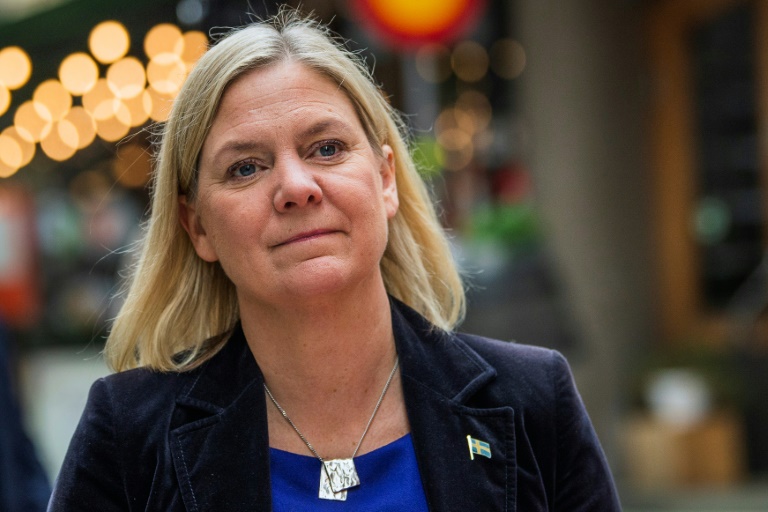Sweden’s parliament elected Finance Minister Magdalena Andersson as the country’s first woman prime minister on Wednesday, hours after she clinched a last-minute deal that gave her victory by the slimmest of possible margins.
The 54-year-old, who took over as leader of the Social Democrats earlier this month, reached a deal with the Left Party late on Tuesday to raise pensions in exchange for its backing in Wednesday’s vote in parliament.
She had earlier received the support of the Social Democrats’ coalition partner the Greens, as well as the Centre Party.
Despite being a nation that has long championed gender equality, Sweden has never had a woman as prime minister.
Andersson called it “a special day”, coming 100 years after Sweden allowed female suffrage.
All other Nordic countries — Norway, Denmark, Finland and Iceland — have seen women lead their governments.
However, Andersson now heads a weak minority government whose hands will be tied on numerous issues, and she faced her first setback even before her election.
The Centre Party announced that while it would not oppose Andersson in the vote for prime minister, it would withdraw its support for the government’s budget to be voted on later on Wednesday, due to the concessions made to the Left.
That means Andersson will in all likelihood have to govern with a budget presented by the opposition conservative Moderates, Christian Democrats and far-right Sweden Democrats.
Moderates Party leader Ulf Kristersson said the Social Democrats and Greens were “desperately” clinging to power.
“They can’t get their policies adopted but they want to govern at any price.
This is so desperate,” he told news agency TT.
A total of 117 members of parliament voted for her, while 57 abstained, 174 voted against and one was absent.
Under Sweden’s system, a prime ministerial candidate does not need the support of a majority in parliament, they just need to not have a majority — or 175 votes — against them.
But Andersson was undeterred.
“I think I can govern the country regardless,” she told reporters after the vote, adding: “I think Sweden can do better.”
Andersson succeeds Stefan Lofven, who resigned on November 10 after seven years as prime minister in a widely expected move aimed at giving his successor time to prepare for the country’s September 2022 general election.
Andersson will formally take over her functions and present her government on Friday.
The change comes as the Social Democrats currently hover close to their lowest-ever approval ratings with elections less than a year away.
The right-wing opposition, led by the conservative Moderates, has in recent years inched closer to the anti-immigration Sweden Democrats and hopes to govern with its informal backing.
– ‘Pragmatic’ technocrat –
After being confirmed as the Social Democrats’ leader in early November, Andersson, a former junior swimming champion often described as “pragmatic” and a “technocratic bureaucrat”, outlined three political priorities going forward.
She said she wanted to “take back democratic control of schools, healthcare and elderly care”, and move away from welfare sector privatisation.
She also said she aimed to make Sweden a worldwide role model in climate transition.
And she vowed to end the segregation, shootings and bombings that have plagued the country in recent years, usually due to rival gangs settling scores or organised crime battling over the drug market.
The violence has mainly hit disadvantaged neighbourhoods with large immigrant populations, but has increasingly spilt over into other areas.
In 2020, 47 people were killed in 366 shootings in the country of 10.3 million people, according to official statistics.
There were also 107 bombings and 102 attempted detonations.
Crime and immigration are expected to be among Swedes’ main concerns in next year’s election.
Lund University political analyst Anders Sannerstedt predicted it would be a “close race”.
“Right now four parties to the right command 174 seats (in parliament), while the four parties to the left have 175 seats.
Recent polls show roughly the same,” he said.
Sannerstedt said he expected “no major changes” in policies from a government headed by Andersson.











